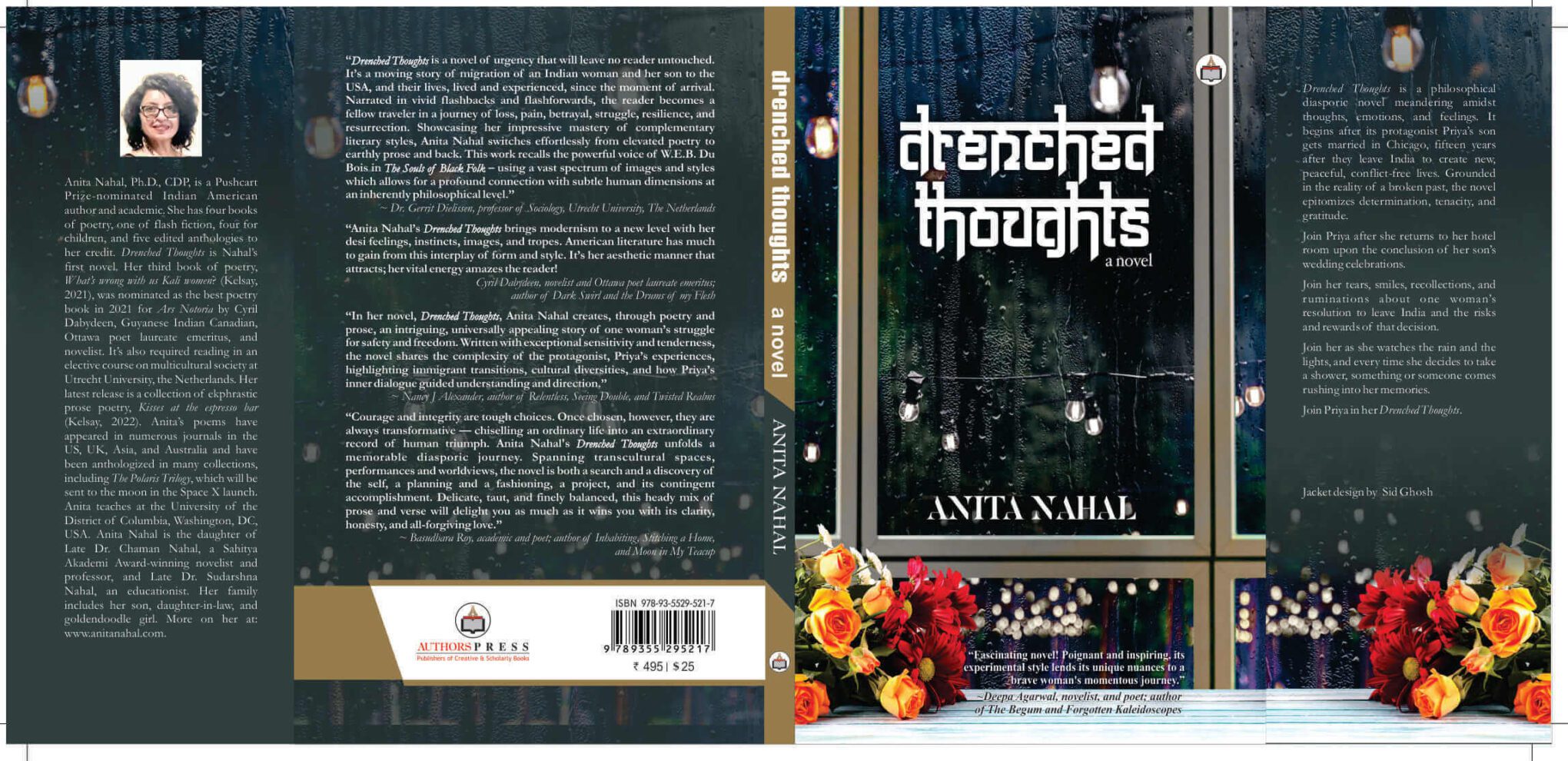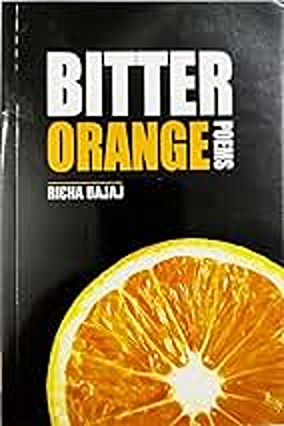Prof. Nandini reviews Anita Nahal’s “Drenched Thoughts” for its emotional depth, narrative depth, and portrayal of Priya’s journey, emphasising its relevance in diaspora literature, exclusively for Different Truths.

Reading Anita Nahal’s novel, Drenched Thoughts is a heartrending experience for any sensitive reader. The blurb can catch the reader’s attention, as Dr Gerrit Dielissen writes:
“Drenched Thoughts is a novel of urgency that will leave no reader untouched. It’s a moving story of the migration of an Indian woman and her son to the USA and their lives, lived and experienced, since the moment of arrival. Narrated in vivid flashbacks and flash-forwards, the reader becomes a fellow traveller on a journey of loss, pain, betrayal, struggle, resilience, and resurrection. Showcasing her impressive mastery of complementary literary styles, Anita Nahal switches effortlessly from elevated poetry to earthly prose and back. This work recalls the powerful voice of WEB Du Bois in The Souls of Black Folk, using a vast spectrum of images and styles that allow for a profound connection with subtle human dimensions at an inherently philosophical level.”
Nahal is at her best when she employs sheer poetic prose in her fiction. In her novel Drenched Thoughts, the story of the protagonist sounds partly autobiographical and partly observational; she is out and about in the world in search of a ‘room of her own’, where she unpretentiously longs to ‘belong’, which, eventually and seamlessly, she does at the end. When a skilled writer like Nahal uses poetic prose, it can be a potent tool to arouse emotions, paint vivid imagery, and create a rich atmosphere within the narrative. It goes beyond the functional aspects of storytelling and delves into the realm of aesthetics, engaging readers on a sensory and emotional level.
Poetic prose is instrumental in establishing the emotional tone and atmosphere of a scene.
Poetic prose is instrumental in establishing the emotional tone and atmosphere of a scene. By carefully choosing words and crafting sentences with rhythmic beauty, an author can immerse the reader in the intended mood, whether it’s the haunting stillness of a moonlit night or the exuberant chaos of a bustling market. Describing characters with poetic language can elevate their presence and reveal nuances that transcend the surface. Metaphors and similes can be employed to draw parallels between a character’s inner world and the external environment, providing readers with a deeper understanding of their essence. Poetic prose allows for the incorporation of symbolism and allegory, enriching the narrative with layers of meaning.
By using metaphorical language, Nahal infuses objects, settings, or events with deeper significance, inspiring readers to explore themes beyond the literal. Poetry allows for a nuanced exploration of themes, enabling Nahal to delve into complex ideas with subtlety and grace. Through the artful arrangement of words, she conveys the essence of her themes, fostering a more profound connection with readers.
Poetic prose excels at engaging the senses, making the fictional world come alive. By appealing to sight, sound, touch, taste, and smell with evocative language, Nahal transports readers into the heart of the story. Incorporating poetic prose in fiction requires a delicate balance, ensuring that the language serves the narrative without overshadowing it. When used judiciously, poetic elements can elevate the reading experience, turning a story into an embroidery of words that linger in the reader’s imagination. In this novel, the protagonist introduces herself in the first-person narrative through sheer poetic prose:
“I’m someone writing this story Of a single mom, could be me too, or a random Or you too, or her, for it’s not easy to define anyone’s gory glory Tracee Ellis Ross: “A woman’s fury holds a lifetime of wisdom.” They say most women are more restless than men, a bit more After all, their heartbeats are preoccupied a bit more And if you feel their impatience leads to anger, sometimes A rebellion sometimes A certain withdrawal A certain suspicion A certain everything kind of trepidation Then not to merge the silvery moon with the red sun could be a brawl Because of you, me and the others can be the stories Some fully cooked, some half-baked, through always real stories.”
Her Drenched Thoughts is a welcome addition to the genre of diaspora fiction.
Her Drenched Thoughts is a welcome addition to the genre of diaspora fiction. Diaspora novels hold significant importance in literature as they provide a unique and underrepresented perspective on human experience. These narratives typically explore the lives of individuals or communities who are expatriates from their original homeland, navigating the complexities of identity, culture and belonging in a new and unfamiliar milieu.
Diaspora novels delve into the intricacies of culture, customs, and traditions. They become a means of exploring and preserving the cultural heritage of a community that has been scattered across different geographic locations. Through these novels, readers gain insights into diverse cultural practices and historical contexts. The theme of identity and belonging is central to many diaspora tales.
Characters grapple with questions of who they are and where they belong, reflecting the challenges faced by individuals in real-life diaspora communities. These narratives contribute to a broader understanding of the fluid and dynamic nature of identity. Diaspora novels provide a global perspective on social and political issues. By exploring the experiences of those who have migrated, these stories shed light on the impact of globalisation, immigration policies, and geopolitical events on individuals and communities. They contribute to a more comprehensive understanding of the interconnectedness of the world.
Diaspora novels serve as a bridge for cultural exchange and shared understanding.
Diaspora novels serve as a bridge for cultural exchange and shared understanding. Through the portrayal of characters navigating multiple cultural contexts, readers gain empathy and insight into the challenges faced by diaspora communities. This fosters a sense of collective humanity and breaks down cultural barriers. Many diaspora novels incorporate multiple languages, reflecting the linguistic diversity of the characters’ experiences. This linguistic richness adds depth to the narrative and highlights the importance of language in shaping cultural identity. It also introduces readers to languages and expressions they may not encounter in conventional literature.
Diaspora novels serve as historical documents, chronicling the experiences of communities during times of migration, conflict, or political upheaval. These narratives become a valuable resource for understanding the social, cultural, and emotional dimensions of historical events. Diaspora novels frequently employ innovative literary techniques to capture the complexity of the diasporic experiences. The struggle to belong in the new world has its complexities. Nahal’s camera never misses the minute details of these complex situations and emotions while introducing Priya to the new homeland:
“Priya really needed to shower, feeling worn-out and sweaty. She took out her son’s note again from her black-tote bag and started thinking about single immigrants, especially moms.
“What’s all that paperwork, mummy? Avijeet asked her one evening, a couple of months after they had first arrived in the US. The wide coffee table they had bought second-hand at Goodwill was occupied with many papers and files and our Social Security numbers. Must keep them safe somewhere. And then I must get a driving license. I mean we don’t have a car yet, but your Mahima aunty is visiting us next month and we may rent a car.”
‘Yes, that makes sense.”
(Nahal 126)
Diaspora authors experiment with narrative structures, linguistic styles, and storytelling methods, contributing to the richness and diversity of literary expression. Diaspora novels provide a platform for marginalised voices and contribute to the representation of underrepresented communities in literature. By telling stories that are often overlooked or marginalised, these narratives empower individuals within diaspora communities and offer a sense of visibility and recognition.
Nahal’s Drenched Thoughts is a unique diaspora novel that plays a crucial role in expanding literary landscapes…
Nahal’s Drenched Thoughts is a unique diaspora novel that plays a crucial role in expanding literary landscapes, fostering cultural understanding, and documenting the multilayered experiences of individuals and communities navigating the challenges of displacement and adaptation. Through this engaging story of Priya, Nahal contributes to a more inclusive and interconnected global literary canon. When Priya comes to the USA from South Delhi, with her Arya Samaji habits and a broken marriage, she gets a culture shock; everyone has a word of advice for her, to her discomfiture:
“You know, just tears of relief, that all went smoothly despite relatives from her ex-husband’s family being there and no major fights ensuing! Let it all out, Priya. Stand under a steaming shower.
“I’m not going to feel remorseful this time for wasting water mama…” she said out loud.
“Priya, be careful not to run the water for too long. Don’t take a shower, beta, just fill the balti and have a bath like that.”
(Nahal 23)
Nahal is a realist and a modernist; in whose works the modernist traits are vibrant.
Nahal is a realist and a modernist; in whose works the modernist traits are vibrant. Modernism in diaspora novels reflects a literary movement that emerged in the early to mid-20th century, characterised by a departure from traditional narrative structures and an exploration of new forms of expression.
Diaspora novels within the modernist tradition exhibit certain features and themes associated with the broader modernist movement, while also addressing the complexities of displacement, identity, and cultural hybridity inherent in diasporic experiences. Modernist literature is known for its fragmentation of narrative and experimentation with ‘the stream of consciousness’.
Diaspora novels employ these techniques to represent the fractured and dislocated nature of the diasporic experience. The narratives unfold through disjointed perspectives, fragmented memories, and a non-linear structure, mirroring the complexity of identity in the diaspora. Modernist diaspora novels explore the theme of cultural hybridity and the resulting identity crisis. Characters grapple with multiple cultural influences, leading to a sense of displacement and disorientation. The narrative might reflect the fragmented and fluid nature of identity as characters navigate between different cultural worlds.
Symbolism and allegory, common features of modernist literature, are used in diaspora novels to convey deeper meanings related to the challenges of migration and cultural displacement. Objects, landscapes, or events take on symbolic significance, providing a nuanced exploration of the diasporic condition. The narratives engage with existential themes, questioning the meaning and purpose of existence in the face of displacement.
Characters contend with the uncertainty and existential angst that accompanies the experience of living in a diaspora situation. Modernist diaspora novels explore the impact of urbanisation and the modern city on the identity of the characters. Characters navigate the complexities of urban life, reflecting the broader modernist fascination with the changing landscape of cities and the effects of modernity. Alienation and dislocation are themes of modernist literature and are particularly relevant to diaspora novels.
The characters invariably experience a profound sense of alienation from their homeland.
The characters invariably experience a profound sense of alienation from their homeland. Modernism is known for its interdisciplinary influences, and diaspora novels draw from various artistic and cultural forms, such as music, visual arts, and philosophy, thus a cultural materialistic reading is apt in the case of the interpretation of diaspora literature. This intertextuality enriches the narrative and contributes to a more layered and nuanced representation of diasporic experiences. Modernism in diaspora novels allows for a sophisticated exploration of the intricate web of emotions, cultural tensions and existential questions that arise in the context of migration and displacement.
These narratives contribute to the ongoing evolution of literary forms and provide a platform for expressing the complexities of diasporic identities in the modern world. Keeping in line with these attributes, Nahal narrates people and places in the unfamiliar, diasporic world thus, as a true modernist, of course in her signature style of poetic prose:
“It’s disheartening to share bloody details They say men are from Mars, women from Venus I don’t think females are an antithesis to males But, early on, children are made to believe emotion Can demarcate humans on gender If women shout it’s riding them of splendour And if men cry, they aren’t glad Like the knots in a woman’s delicate plaid But gender is not that simple either Instead of making the effort to question Most folks forget to include in the conversation Lesbian, gay, queer, bisexual, non-binary, transgender There are so many layers to the human being But not many have a nature that’s profoundly seeing.”
(Nahal 58)
Priya, Nahal’s protagonist, understands life in the USA in its multiple meanings…
Priya, Nahal’s protagonist, understands life in the USA in its multiple meanings; she accepts life in the first world country, the modern world, with open arms at present, without looking back:
“Going for a drive in the US is one of the least expensive pastimes! Gas is cheap, roads are mostly well maintained and it’s the best time for catching up!” Her father used to say that when they lived in the US in her childhood. Her parents would often go for drives in the evening or at weekends, without any reason, trying new routes, and seeing neighbouring towns and cities.
A similar pattern Priya followed with her son. This way they came to learn more and more about Arlington, Alexandria, and DC and bonded, catching up on their activities and news of the day.”
(Nahal 130)
Priya looks for love in her new life in the US. But love cannot be found easily. She writes:
“And once decided I think it’s a waste of emotions, time, and money to keep dating others. We are not in our twenties… right? And then to have sex with all of them? How does that make sense? Have you read Steve Harvey’s Act Like a Lady and Think Like a Man? In it, he says women should not sleep with someone they are dating till three months have passed.”
“Yes, but the people you date might be working on a different timeline and thinking.”
“Agreed, and not only that but there are also such specific rules in the Western world. Or maybe it’s an American thing? Or maybe it’s just the thing of the American men I dated. Like, after the first date, one needs to wait for three days at least before texting or calling. Anything less is perceived as neediness.”
“And people develop blocks in their mind which are sometimes not easy to alter. Overall, I tell you even though Bollywood might have screwed up love and romance for decades, yet folks in India are generally quick to realise whether they want someone or not, and believe it or not, their marriages work.”
“I understand, I feel bad that you are not able to find someone. And you deserve love. You truly do.”
“I think I do. But something or the other goes wrong each time. Either, I don’t want them, in which case I tell them right after a few dates. And the ones I like, they don’t want to keep going forward without an open-ended system in place. It sucks. Maybe, I suck at relationship stuff.”
(Nahal 208)
Priya discovers herself in the process of making and breaking her intimate relationship in the US.
The theme of the discovery of the self is a powerful and universal motif in literature, explored effectively by Nahal in the novel, Drenched Thoughts. Priya discovers herself in the process of making and breaking her intimate relationship in the US. This theme involves the protagonist’s journey to self-awareness, self-acceptance, and a deeper understanding of her own identity. The process of self-discovery is transformative, and it serves as a central narrative. Priya embarks on a journey to uncover her true identity. This involves questioning societal expectations, exploring personal beliefs, and confronting internal conflicts. The discovery of her identity may be linked to aspects such as culture, gender, sexuality, or personal values.
Priya discovers her true self through overcoming challenges and adversity. The trials she faces force her to confront her fears, weaknesses, and insecurities, leading to her personal growth and self-realization. The process of overcoming obstacles becomes a catalyst for self-discovery for Priya. The narrative delves into the protagonist’s inner thoughts and reflections. Through introspective moments, the central character grapples with her past, present and future, seeking to understand her motivations, desires, and fears. These moments of self-reflection contribute to the character’s journey of self-discovery.
Interpersonal relationships play a crucial role in the discovery of the self in the novel. Priya learns about herself through her interactions with others, whether it’s through friendships, romantic relationships, or familial relationships. These connections often act as mirrors, reflecting different surfaces of the character’s identity. The discovery of the self, in the case of the protagonist here, is intertwined with cultural or spiritual exploration. The diaspora characters reconnect with their cultural roots, question religious beliefs, or embark on a spiritual quest to find deeper meaning and understanding. These elements contribute to a more profound self-awareness of the diaspora community in the ‘imaginary homeland’ that they must face quite often.
Nahal depicts characters searching for their passion or life’s purpose in the novel Drenched Thoughts.
Nahal depicts characters searching for their passion or life’s purpose in the novel Drenched Thoughts. The journey to discover what truly fulfils them and gives their life meaning is the central theme. This quest involves taking risks, pursuing dreams, and breaking free from inhibitions. To quote Nancy J Alexander from the blurb of Drenched Thoughts:
“In her novel Drenched Thoughts, Anita Nahal creates, through poetry and prose, an intriguing, universally appealing story of one woman’s struggle for safety and freedom. Written with exceptional sensitivity and tenderness, the novel shares the complexity of the protagonist, Priya’s experiences, highlighting immigrant transitions, cultural diversities, and how Priya’s inner dialogue guided understanding and directions.”
Nahal’s characters may grapple with moral and ethical dilemmas that force them to confront their values, choices, and principles. The choices they make in the face of these dilemmas contribute to their evolving understanding of themselves, shaping their moral compass and sense of integrity. The exploration of memory and the impact of past traumas are a significant aspect of the discovery of the self for most of them in Drenched Thoughts. Characters uncover suppressed memories, confront unresolved issues from their past and ultimately find healing through self-awareness.
Physical journeys and relocations can serve as a backdrop for self-discovery. Symbolic journeys, whether through dreams, metaphors, or allegorical settings, allow her characters to navigate internal landscapes and confront aspects of themselves. The journey to self-discovery involves accepting one’s flaws, embracing strengths, and forgiving oneself for past mistakes. This theme of self-acceptance and forgiveness is a powerful element in this novel centred around the evolution of the protagonist.
While engaging with the character Priya’s inner voice in the novel, one can invariably recall “Room of One’s Own”, an extended essay by Virginia Woolf, originally delivered as a lecture in 1928. The essay explores the relationship between women and literature, and it delves into the social, economic, and cultural conditions that hindered women’s ability to write and express themselves. Woolf argues that economic independence is essential for women to pursue a career in writing or any creative endeavour. In the essay, she states that a woman must have money and a room of her own to write fiction.
Woolf examines the historical representation of women in literature…
Woolf examines the historical representation of women in literature and criticises the limited, often stereotypical roles assigned to female characters. She calls for a more diverse and realistic portrayal of women in fiction. The essay explores the challenges faced by women writers, including societal expectations, lack of educational opportunities, and the dismissive attitude of the male-dominated literary establishment. Woolf reflects on the difficulties women have faced in expressing themselves artistically. Woolf emphasises the importance of freedom for creative expression. She argues that when women have the space, both physically and metaphorically, to think and create without societal constraints, their artistic potential can flourish.
Woolf discusses the distinction between fiction and factual writing, suggesting that women writers have historically been constrained to writing about their personal experiences. She advocates for women to have the freedom to explore a wide range of subjects in their writing and she talks in favour of intellectual equality between men and women. She contends that women have the same intellectual capabilities as men and should be given equal opportunities in education and the arts.
Woolf introduces the concept of the “androgynous mind,” where individuals possess both masculine and feminine qualities in their thinking. She suggests that this type of mind is essential for producing great works of literature, breaking free from gender constraints. She reflects on the literary tradition and the need for women to both inherit and challenge it. She encourages women to participate in the literary conversation and to contribute their unique perspectives to the ongoing narrative of human experience. While not explicitly framing her essay as a feminist manifesto, Woolf’s work is considered foundational to feminist literary criticism.
She contributes to the early feminist discourse by addressing the social and institutional obstacles faced by women in the pursuit of intellectual and artistic endeavours. Woolf contemplates the legacy that women writers can leave for future generations. By asserting their voices and challenging societal norms, women can pave the way for greater opportunities and freedoms for those who come after them.
“A Room of One’s Own” remains a seminal work in feminist literature and a source of inspiration for those advocating for gender equality in the arts and beyond. Woolf’s messages resonate not only in the context of her time but continue to be relevant in discussions about women’s voices and creativity. Anita Nahal’s novel resonates with the ideas and the ideology of Virginia Woolf when she unswervingly speaks through her personae, Priya, without mincing her words:
“Sixteen years ago, they left India
Made home in Northern Virginia
Felt her soul would fly into shards, tatter
When they moved, just them two
Their life they tried to patch and sew
And to them only, it did matter
No one else really cared or could understand
They were the only ones left in their shrinking band.
Single mom, immigrant, coloured, older woman
How many blocks are weighted
Against her? She pulls out the lime and lemon
And makes cocktails, making a contract
With her, herself, she, and life
Not to be down despite staffs of life
Not to let anything or anyone
Come between her and her son
See immigration is not easy, even by choice
Sometimes those left behind might mock
Because they remained wearing an old frock
Not out of dislike at your new voice
Simply one going away and others not accepting
Why they left? Self and others bifurcating.”
(Nahal 206)
The character looks intriguingly interesting when Nahal presents her as an emancipated woman:
“No more fake agendas written by some men
No more equality diminishing
No more pendulum-shaking Zen
No more spurious standards lowering or raising
Why do some men slouch on recliners, beer in hands?
Why then do they unbuckle their belt, zip open their pants?
Why don’t such exhibitions come from women?
Are fertility eggs stronger than semen?
Is exhaustion an excuse from housework?
Even pretending not to be emasculated
Being in a fool’s paradise elevated
Seems their power egos tend to overwork
Men need to learn more about their tools
Before smearing those learning to swim in the minutest of pools.”
(Nahal 208)… Priya manages to come to terms with life while creating a niche, a space, a secure place for herself.
Yet, in the end, Priya manages to come to terms with life while creating a niche, a space, a secure place for herself. She finds the ‘room of her own’, like Nahal does, in the new land, while comprehending the authenticity of the complex journey of life:
“And she’d place idols and sweets on a thali
And tons of sheen from dried spilt milk, without too much folly
She’d scoop some Ganga water and on their DIL and son sprinkle
A new story spins
A new journey begins.”
(Nahal 209)The novel can import one’s conscious and unconscious mind to a world that Nahal explores, and discovers inch by inch, through her poetic prose lines. The narrative of diaspora life is an interesting attribute of hers. Her story has touched upon issues like ecological balance, cultural milieu, and myriad biases such as ageism, racism, gender, class and more certainly, human relationships. She is a writer who decorates the spirit of human evolution. Freedom of the heart and soul plays a distinct role in her story.
Nahal’s chronicle of the new life is associated with diasporic consciousness as a phenomenon, offered not in seclusion, but in a miscellaneous milieu of the narratology. Her narrative is a mirror of real landscape, geography, renovation, imagination, rejuvenation, and insurgency as modes of evolution, Nahal is the epitome of poise and an inquisitor, and her rumination is a mode of refurbishment for the writer and the protagonist. It is a complex story carrying life to its romantic, forfeiting and desolate yet accepted best.
Works Cited:
· Nahal, Anita. Drenched Thoughts. Authorspress, India. 2023.
· Woolf, Virginia. A Room of One’s Own.
https://www.goodreads.com/book/show/18521.A_Room_of_One_s_Own
Cover photo sourced by the reviewer.





 By
By
 By
By
 By
By
 By
By